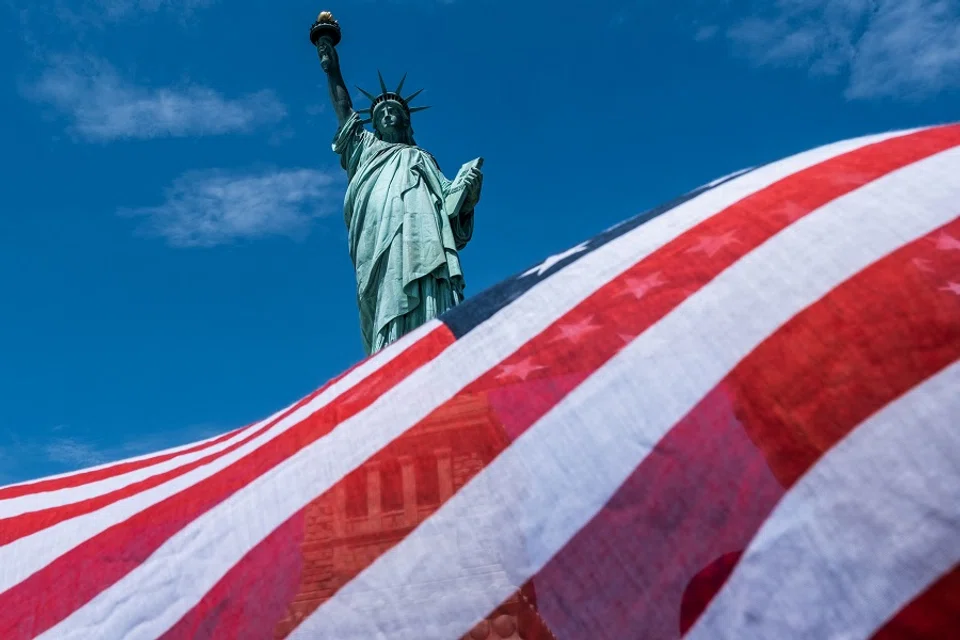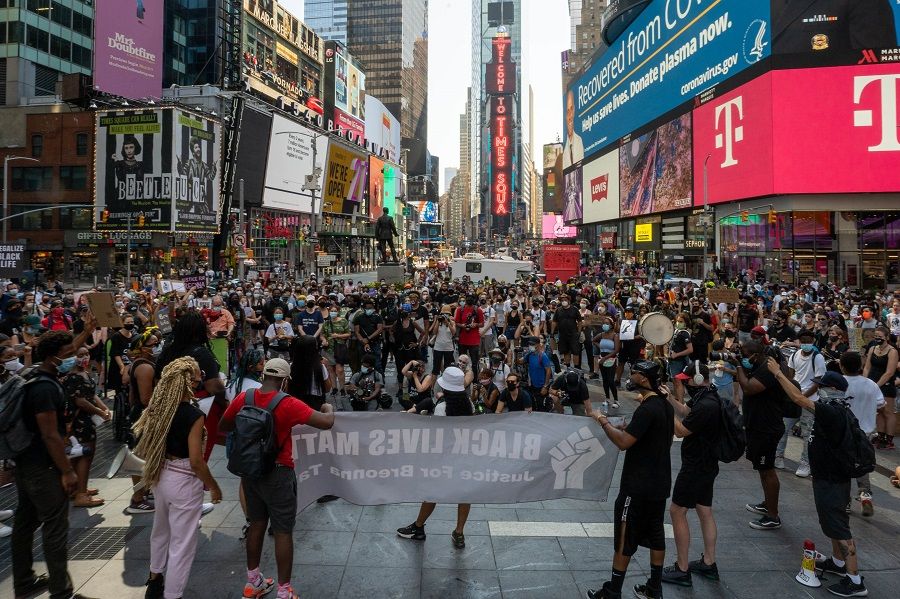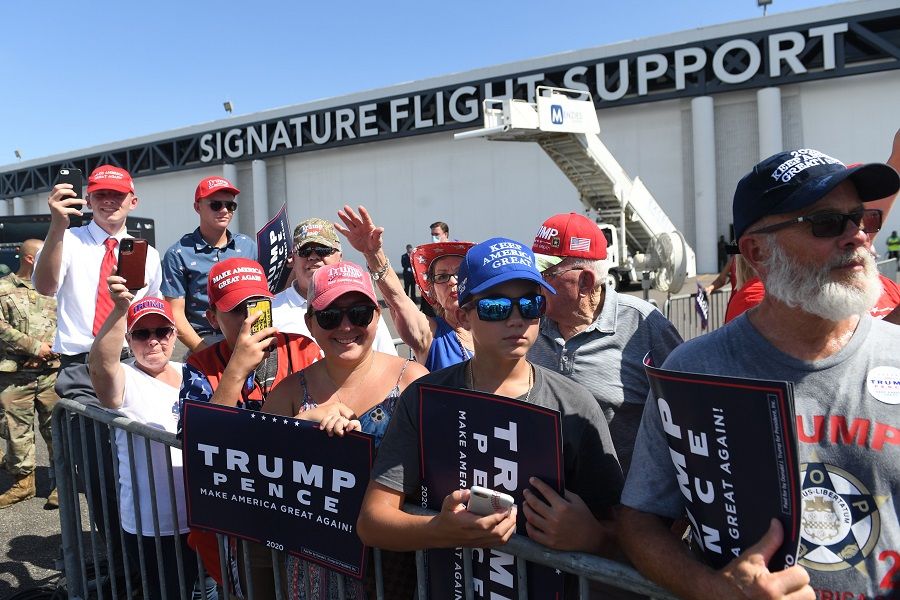A 'failed state'? China must not misjudge the US

Since Trump became the US Republican presidential candidate, the traditional US political elites and media have not fancied his chances because of his political style, labelled as "authoritarian populism" by US scholars. Almost all of the Trump administration's domestic and diplomatic affairs run counter to the US tradition, resulting in much chaos.
Within the US, there is considerable discussion of its decline. Many believe that Trump has not only failed to "make America great again" as he has proclaimed, but instead has accelerated its decline. Some in the US have even begun to regard the US under the Trump administration as a "failed state".
...believing that it has become a failed state and touting this as the opportunity for China to displace the US on the global stage. They advocate open hostility towards the US on all issues.
Externally, Trump's America is also not fancied. The Covid-19 crisis is unprecedented in the sense that no country, including US allies, has sought help from the US since the US entered the global arena more than a century ago. The world, especially US allies, knows that the US has committed strategic errors. However, out of either the "fear" of Trump or a sense of helplessness, no leader of any country has openly cautioned Trump or the US.

China has also displayed mixed emotions towards the US under the Trump administration. Many worry about Trump's irrationality and unpredictability in action, especially when he is facing an unfavourable lead-up to the US presidential election. Will he shift the focus towards external conflicts and play the "China card" to the extreme? Will he continue to escalate the US-China cold war, or will he challenge China's core interests in the South China Sea and Taiwan to the extent of declaring war? Yet, even more people are slighting the US, believing that it has become a failed state and touting this as the opportunity for China to displace the US on the global stage. They advocate open hostility towards the US on all issues.
At this stage of China's development, its emergence is unstoppable regardless of the US's China policy. However, it will be an enormous strategic error to presuppose that China can displace the US because the US has declined or will disintegrate, like the views of some in the US itself. China, unlike other countries, cannot misjudge the US because the US has defined China as its biggest enemy. China's assessment of the US must be fact-based and realistic.
Conflicts in US domestic and global affairs
As foreign relations are an extension of domestic affairs, the US foreign policy is a reflection of its domestic affairs, in which several major conflicts exist today.
Selfish politicians have become irreconcilably extreme in their public opposition and hatred of one another.
First, there are racial conflicts, mainly manifested in the Black Life Matters (BLM) movement that has drowned all other movements involving race.

Second, class conflicts have surfaced through huge gaps in income distribution and wealth. With the dominance of neoliberal economics since the 1980s, the middle class that is the pride of the US which had steadily grown after World War II has rapidly shrunk. The middle-class society has evolved into a plutocracy.
Third, the heightened conflict between conservatism and liberalism has led to extreme ideologies, resulting in radical conservatism and radical liberalism that have much reduced common ground and propensity to compromise.
Fourth, political conflicts between the Democrats and Republicans are no longer easily explained by ideologies alone. Selfish politicians have become irreconcilably extreme in their public opposition and hatred of one another.
These conflicts have led to problems in the US system of governance or, some may say, a failure in governance. The crux of this failure lies in the loss of effectiveness of the party system. In modern times, political parties in the West have been the most important means of organising a country's politics. In the US, in particular, almost all problems have been resolved through the transformation of party politics into national policies. Governance, however, cannot be effective when the Democratic and Republican parties oppose and veto each other.
...the US is withdrawing from international organisations because of its inability to sustain an over-expanded "empire" due to its domestic difficulties.

These domestic problems are mirrored globally in various ways, resulting in many international and diplomatic issues.
First, ally relationships must be recalibrated as alliances are the focus of US foreign relations. Upon entering the global system during World War I and assuming leadership after World War II, the US has - despite providing most of the international public goods - relied mainly on its alliances in domination. Evidently, no single country dominates global affairs. After Trump came to power, the US has rapidly reduced its commitments to its allies, by either asking them to bear a greater proportion of the costs in maintaining the alliances or reducing assistance and support.
Second, the US is withdrawing from international organisations because of its inability to sustain an over-expanded "empire" due to its domestic difficulties. Prior to Trump's presidency, President Obama had started reducing unnecessary US involvement in international affairs, by planning to systematically withdraw from affairs of declining importance to the US, especially Middle East issues, and turning to regions that are relatively more important, such as Asia-Pacific. However, this strategy has evolved into a comprehensive withdrawal after Trump took office. The US has withdrawn from some UN organisations, such as the World Health Organization (WHO), and regional agreements which it has led, such as the Trans-Pacific Partnership (TPP). Multilateral agreements have been renegotiated, such as the North American Free Trade Agreement (NAFTA).

Third, US nationalist sentiments have grown, corresponding to the rise of domestic populism. Nationalism is a weapon only for weak countries, however. Since becoming the most powerful country after World War II, the US is the most international country with minimal nationalist tendencies. To many Americans, the US has nothing to do with nationalism. Up until the 2007-2008 global financial crisis, the US was confident, open and inclusive.
The intensification of domestic conflicts in the US has led to the rise of Trump's populism. The external manifestation of domestic populism is nationalism, in the forms of trade protectionism, economic nationalism and anti-immigration at the policy level. It is foreseeable that US nationalism will further rise if the US cannot solve its domestic governance problems and continues to weaken.
Fourth, the US's soft power will decline as the inevitable outcome of the rise of nationalistic foreign policy. Nationalistic foreign relations represent the selfishness and profit-orientation of a country that disregards the interests of other countries and even allies. After Trump came to power, many US allies tread cautiously when dealing with the US, wanting to neither offend him nor blindly follow the US.
Identity politics will have a lasting impact on the US's China policy because it profoundly affects the US society's public perception of China. Once this perception is entrenched in the society, it becomes a culture which is difficult to change.

Fifth, the US's China policy has become hostile, both externally and domestically. Externally, the US has officially defined China as its top opponent, with Russia being the second. US foreign relations now focus on China, endeavouring to form the broadest united front against a common enemy. More importantly, the China policy has also become an important US domestic issue, with the two parties in competition on their aggression against China. Identity politics plays a critical role in this, which is to demonise China.
Identity politics will have a lasting impact on the US's China policy because it profoundly affects the US society's public perception of China. Once this perception is entrenched in the society, it becomes a culture which is difficult to change. The US's identity politics against the Soviet Union continues to exert an influence today. Without changing the society's culture, it is improbable for the US to improve relations with Russia even if it wants to do so.
The US is not weak
The combination of the domestic conflicts in the US and its aggressive China policy has caused some to misjudge the US. If influenced by the misjudgment, China's foreign policy may unavoidably play into the US's China policy agenda. Therefore, one must make a rational and fact-based analysis of the current US situation, including the following, in order to formulate an effective policy towards the US.
The open US political system constantly prepares for the future through amending its Constitution according to the needs of the times.
First, the current crisis of governance in the US is triggered by a political crisis instead of a crisis of the overall political system. At the core of the US political system is its Constitution, which embodies the American spirit. Regarded as the first "new nation", the founding of the US organically combined the best elements of civilised systems at the time without being burdened with historical baggage. So, although very young as a country, the US is indeed representative of Western civilisation.

The open US political system constantly prepares for the future through amending its Constitution according to the needs of the times. The US has had great and mediocre leaders, who made and corrected mistakes. Today's BLM movement, in which statues of politicians who wrote the US Constitution are toppled, is a reckoning of US history. Unlike the statues, the US Constitution may be amended but not abandoned. An alternative to the US political system in the foreseeable future is inconceivable.
The design of the US political system has adequately catered for social protests and rebellions as inherent parts of the system.
Second, the US institutional space or "institutional cage" (NB: 制度笼子, zhidu longzi, a phrase popularised by Chinese President Xi Jinping since 2013. It describes the need to "shut" power into an institutional cage to avoid its abuse.) is sufficiently large to accommodate social movements. The design of the US political system has adequately catered for social protests and rebellions as inherent parts of the system. The flourishing Black movements have made some wonder if the US system will collapse and the "institutional cage" will be broken, although these remain unlikely.
Today's Black movements are a far cry from the civil rights movements of the 1960s and 1970s, which also saw massive opposition to US involvement in the Vietnam War. The US approach is to enlarge the "cage" by granting increased legal rights to the various social groups. Consequently, the various social movements have affected the US but not change the nature of the system. Even the prevalence of identity politics and the fragmentation of social movements in the US today are unable to effectively impact upon the overall political system.

Third, radical liberalism has brought about a powerful backlash of conservatism in the US. Today's social movements, a product of radical liberalism that conforms to liberalist logic, do not imply that the US society will develop along the lines of radical liberalism. Although liberalism had driven the development of US politics and economy after World War II, Reaganism or neoconservatism emerged since the 1980s.
With the radicalisation of the BLM movement, conservatism is also on the rise. The contest between liberal and conservative forces is inevitable until a new equilibrium is reached. Will civil war occur in the US in this process? As earlier mentioned, not many believe that the Liberal-Conservative contest will evolve into civil war, since the US political system can basically accommodate all kinds of social protests and rebellions.
With little evidence that the US's hard power is currently waning, its presence and eventual strengthening will help the US recover its soft power in the long run.
Fourth, the separation of the 'economic' and the 'political' in capitalism, ensures economic autonomy and is one of the most significant Western institutional innovations in modern times. The decoupling is necessitated by capitalists seeking independence to avoid political and social impacts on their capital. Western systems have had capital as the core, and institutions built to ensure its protection. Not much has changed since Marx drew attention to this. Hence, all other problems will not have a ruinous impact on Western economies. Politics may intervene, regulate and modify the economy but will not dictate economic laws and principles, as shown by the Covid-19 crisis. While the coronavirus has caused significant impact on all aspects of the US society, daily lives and economics, it has not threatened the fundamental US economic system in a big way.
Fifth, after every crisis, the hard power of the US remains relatively unaffected but strengthens while its soft power within the international community weakens. One important factor, among many, is the above mentioned decoupling of politics and the economy. With little evidence that the US's hard power is currently waning, its presence and eventual strengthening will help the US recover its soft power in the long run.
China must coexist with the US

Taking these facts into consideration, the following conclusions are straightforward.
First, the US's decline is relative to other countries' development. Compared with its past, the US continues to develop but at a slower pace.
...the decline theory in the US is mainly caused by the Americans' deep sense of crisis. Driven by it, the US society is impatient relative to other countries.
Second, the decline of superpowers is a long process. Cases in point include the decline of China during the late Qing dynasty and the disintegration of the Soviet Union, yet Russia's military remains one of the most powerful to this day. The US may still revive its fortunes.
Third, the US has only partially declined. No country comes close to the US in economy, military, technology and innovation.
Fourth, the decline theory in the US is mainly caused by the Americans' deep sense of crisis. Driven by it, the US society is impatient relative to other countries. This is due to the candour of Americans, a result of US democracy, openness and freedom, as well as the media's exaggeration of negative news. As politicians must address the society's deep sense of crisis in order to secure votes, it is commonplace in the West and the US to hear of their declines.
The conclusions regarding China-US relations are clear. First, the tension between the two countries is structural, in that China's emergence is regarded as a real threat by the US. Second, the US may impede and impinge on China's development but will be unable to halt China's continued rise. Third, while the US cannot contain China, China is unable to supplant the US. Fourth, the real problem for China and the US is coexistence. Pondering the issues at hand, China should begin by discarding all impractical illusions and learning to coexist with the US.
Related: The US will accelerate its own decline by suppressing China | A great America is in China's interest | The US empire will not fall anytime soon, going by ancient China's experience | America's tussle with WHO: Are UN specialised agencies 'toothless and useless'? | Why did the US fail to contain Covid-19? | Why is the West ganging up to fight the Chinese ruling party?
